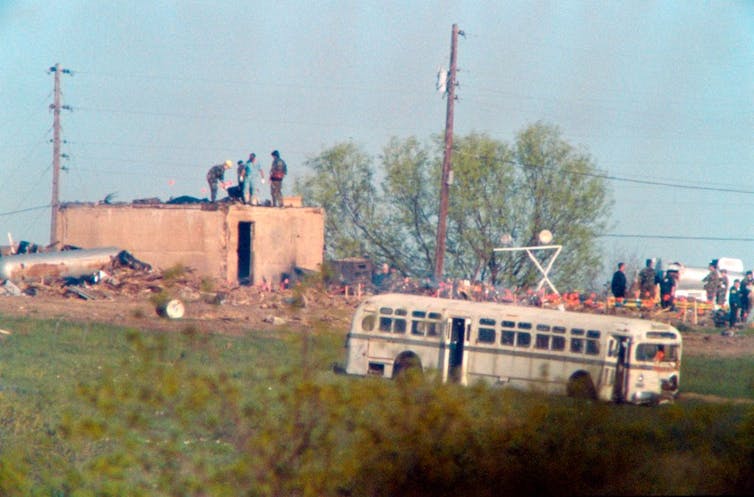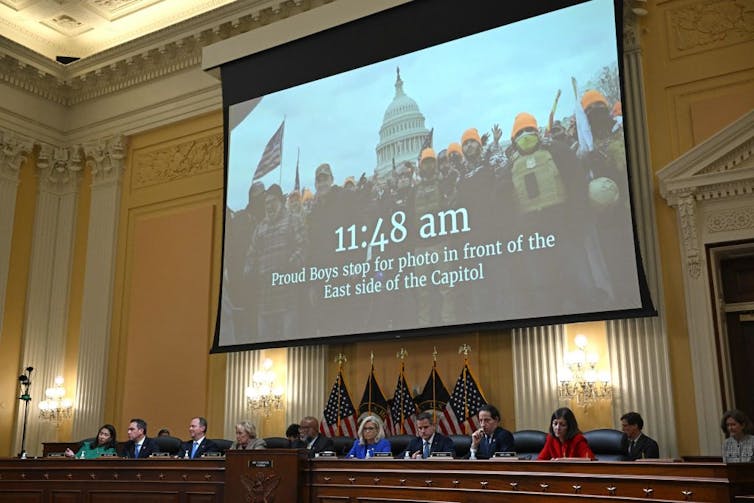30 Years Later, Waco Siege Still Resonates – Especially among Anti-Government Extremists
Waco has been used as a rallying cry for decades, two scholars of domestic extremism explain.
Part of the siege’s legacy in popular culture is tied to sensational coverage that has presented the Branch Davidians as a cult. But the tragedy is also a powerful moment in political extremist groups’ ideologies. As scholars of domestic extremism, we have repeatedly seen how what happened at the Mount Carmel Center has been used by anti-government groups from the 1990s to today.
51 days on edge
The Branch Davidians, who believe that the apocalypse is imminent in their lifetime, are a splinter group of the Seventh-day Adventist Church. Davidians believe that living prophets are given divine gifts of interpretation to lead the members of the church into preparation for the last days. David Koresh, a young man who had taken charge of the small group, claimed to be the final prophet before the end times.
Suspecting that the group was illegally stockpiling weapons, agents from the Bureau of Alcohol, Tobacco and Firearms – also known as the ATF – attempted to execute a search warrant at the Mount Caramel Center on Feb. 28, 1993. They hoped to arrest Koresh on suspicion of weapons violations and allegations of child abuse.
A gunfight ensued that killed four ATF agents and six Branch Davidians, leading to a 51-day siege. Law enforcement isolated the compound from the outside world, and attempts at negotiation failed.
On April 19, in an effort to end the siege, the FBI used tear gas to try to force members out of the compound. A massive fire broke out, and by the end, another 76 Branch Davidians had died, including 25 children. Some of the victims had died of gunshots.

Early questions
Many Americans had watched news coverage of the siege for weeks and were horrified at the loss of life during a government operation. What had happened that last day of the siege, particularly the origins of the fire, was highly contested from the start.
In response to criticism of the federal government, leaders such as then-President Bill Clinton emphasized Koresh’s responsibility for the siege’s outcome. Attorney General Janet Reno, who had approved the FBI’s assault, had no responsibility in the deaths because “some religious fanatics murdered themselves,” Clinton said in a news conference.
In 2000, the Department of Justice released a report headed by former Missouri Sen. John Danforth that cleared the government of wrongdoing. Investigators had acknowledged that the FBI used incendiary tear gas canisters but concluded that the Branch Davidians themselves started the fire. This argument was tied to the Branch Davidians’ beliefs, and the idea that some may have wanted to fulfill Koresh’s prophecies about the apocalypse.
Extremist legacy
However, critics dismissed the report as essentially a cover-up, and some extremists believed that federal law enforcement had deliberately murdered Branch Davidians.
This fear fed into existing conspiracy theories about a “New World Order:” an extremist belief that the federal government plans to destroy personal liberty and eventually confiscate firearms before merging the United States with a global government.
In the 1990s, for example, conspiracy theorist, author and short-wave radio host William Cooper regularly warned his readers and listeners of an eventual “One-World Government.”
Shortly after the Waco tragedy, attorney and militia member Linda D. Thompson began to widely disseminate a video called “Waco: The Big Lie,” through right-wing talk radio and conspiracy theorists. The video aims to convince viewers that there was a concerted effort to kill residents at the compound, and it became a powerful tool among extremists. Around the same time, unorganized militia movements took off, calling for community defense and strong Second Amendment rights to defend against an encroaching federal government.
Timothy McVeigh and Terry Nichols carried out the Oklahoma City Bombing on the second anniversary of the Waco fire and cited the siege as justification for their attack, which killed 168 people. McVeigh had even worn a T-shirt that said “FBI – Federal Bureau of Incineration” before the bombing.

Another conspiracy theorist who fixated on Waco is Alex Jones, the creator and host of the Infowars website. Today, he is most widely known for claiming that the deadly shooting at Sandy Hook Elementary School in 2012 was a government hoax performed by actors, part of a conspiracy to confiscate firearms. But he launched his programs in the 1990s and has often discussed Waco as an example of the evils of the federal government. In 2000, on the seventh anniversary of what he called “the Waco holocaust,” Jones welcomed visitors to a brand new Branch Davidian church on the site in Texas, and later created a video about the siege.
Extremists and Waco today

Waco continues to be a rallying cry for extremism today. To cite one example, Gavin McInnes, the founder of the Proud Boys, has discussed government actions like the Waco siege as an example of government corruption and to accuse it of attacking people of faith whose politics it opposes. A former member has testified that the Proud Boys’ participation in the Jan. 6, 2021, insurrection was driven by belief in a civil war pitting the federal government against citizens, patriots and nationalists.
What unites many of the groups influenced by Waco is a belief that the federal government is tyrannical and willing to attack citizens while depriving them of liberty, freedom and firearms. The perception of a lack of consequences for the deaths at Waco is perceived, in and of itself, as proof of extremist beliefs.
On the three-decade anniversary, as Americans reflect on the Waco tragedy, we believe it is important to remember the unfortunate loss of life – and to be vigilant against demagoguery.
![]()
This article is republished from The Conversation under a Creative Commons license. Read the original article.





